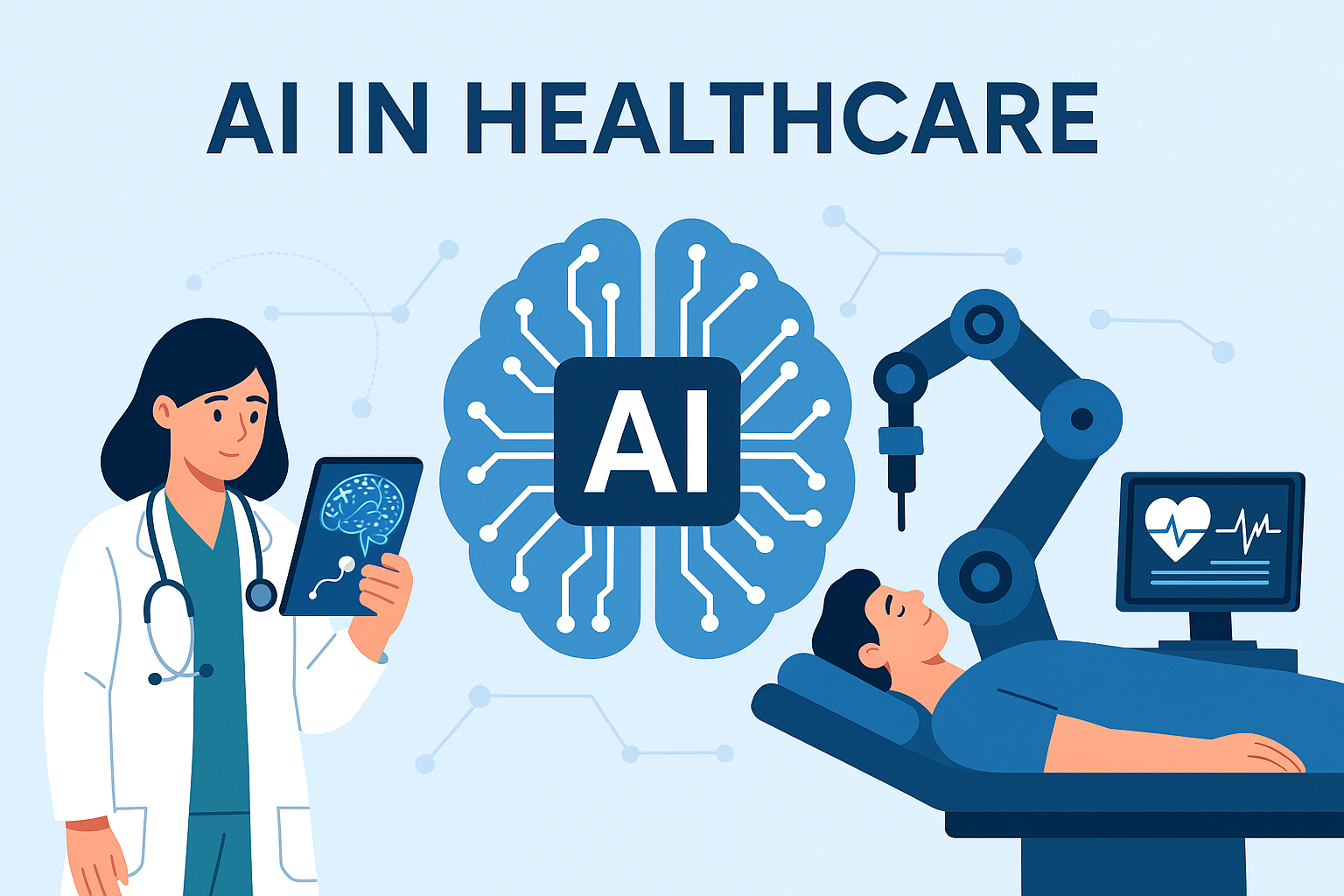
AI in healthcare is the implementation of AI technologies. Machine learning, deep learning, and NLP to enhance the healthcare experience for individuals and healthcare providers. With the help of AI data processing and forecasting skills, medical personnel can more effectively manage their resources. And adopt a more proactive approach to a variety of clinical problems.
As a result of these technologies, medical professionals can make diagnoses that are both more accurate and more prompt. Additionally, health administrators can retrieve electronic health data quickly, and patients can obtain information that is timely and more specific.
How Is AI Used In Healthcare?
AI is the process of automating complex activities and replicating human intelligence through the use of mechanical processes and computers. AI-enabled robots can surpass human intelligence in many respects, especially when it comes to effectively sorting through massive amounts of data to find patterns, anomalies, and trends.
It should come as no surprise that AI offers a plethora of healthcare options. It can improve several routine medical procedures. Disease diagnosis and the development of the most effective treatment regimens for patients with life-threatening conditions like cancer. By reducing physical fluctuations and delivering real-time information throughout the procedure, AI-equipped robotic surgical equipment can assist physicians in performing surgeries more effectively.
Types Of AI In Healthcare:
Artificial Intelligence is a broad word that encompasses several different but connected processes. These are a few of the most popular applications of AI in the medical field:
Machine Learning (ML):
In machine learning (ML), algorithms are trained on data sets, such medical records, to produce models that can categorize data or forecast results, among other things.
Deep Learning:
Increased data volumes, training durations, and layers of machine learning algorithms are used in this subset of machine learning to create neural networks that can handle increasingly challenging tasks.
Natural Language Processing (NLP):
In the medical field, NLP is used to interpret published studies, notes, reports, and documentation.
Robotic Process Automation (RPA):
This entails automating clinical and administrative processes using AI in computer applications. RPA is being used by several healthcare organizations to enhance the daily operations of their facilities and the patient experience.
Applications Of AI In Healthcare:
Industry-wide applications of artificial intelligence are growing in quantity as the technology is embraced more broadly. AI is not yet expected to take the position of medical personnel, according to researchers. Rather, they view technology as helping and enhancing the job that medical experts and providers do soon. Some of the most widely used applications of AI in the industry are as follows:
Diagnostic Assistance:
Medical imaging data, including that obtained from X-rays and MRI scans, has been subjected to AI analysis. Cancer, eye problems, pneumonia, and other illnesses can be better diagnosed with the use of these instruments.
Another area where AI has proven useful is in the field of cardiology, namely in the form of deep learning algorithms that mimic human cardiologists’ abilities to identify heart attacks. In other instances, clinical photos have been used to train AI networks that can reliably classify skin abnormalities and aid in dermatological diagnoses.
According to research, AI can diagnose medical conditions just as well as human specialists, if not better, and far faster.
AI In Drug Discovery:
The pharmaceutical industry faces challenges from research that requires thousands of people hours and rapidly rising development expenses. However, each drug undergoes clinical trials at an estimated average cost of $1.3 billion, and only 10% of these drugs are effectively introduced to the market. Thanks to recent technology, AI is helping to predict reactions, discover suitable trial candidates, and facilitate the medicine development process.
Machine Learning For Better Patient Care:
AI can assist digital communications by providing patients with personalized health advice, reminders for appointments, and recommendations for next steps. Because AI can help doctors make evaluations, patient visits can go faster and more accurately. Which means that patients can get better care more quickly. Furthermore, hospitals, clinics, and physicians can handle many patients daily when they effectively provide a smooth patient experience.
AI In Healthcare Data Management:
When there are trillions of data points, it is possible that information that is extremely valuable could slip through the cracks. Furthermore, the inability to draw connections between significant data points slows down the creation of new medications, preventative medicine, and accurate diagnosis. Artificial intelligence integrates data that would have taken years to process before, all because it can manage enormous amounts of data. Healthcare administrative processes can be made more effective and less costly as a result, leading to better daily operations and experiences for patients.
The Use Of AI In Robotic Surgery:
Artificial intelligence (AI) and robotics are being used in hospitals to assist with a wide range of treatments, from minimally invasive procedures to open heart surgery. During the operation, surgeons can operate the mechanical arms of a robot while seated at a computer console. Simultaneously, the robot gives the doctor an enlarged, three-dimensional view of the operation location. Following the surgeon’s guidance, other members of the team operate in close conjunction with the robot to complete the procedure. Reduced risk of infection, less discomfort, and shorter recovery times have all resulted from the use of robots in surgical procedures.
Artificial intelligence is revolutionizing healthcare by making diagnoses more precise and decisions quicker, ultimately leading to better treatment for patients.
Artificial intelligence is now mostly utilized to enhance efficiency and precision in the healthcare sector. Some current applications of AI in this domain are as follows: The use of AI systems in medical imaging data analysis allows for the rapid and accurate diagnosis of patients by medical professionals. This data consists of images obtained from X-rays, CT scans, and MRIs.
Medical imaging, electrocardiograms, and patient data are all subject to machine learning analysis. Research has shown that AI can improve diagnosis and provide noninvasive methods for assessing cardiovascular risks, which could lead to lifesaving improvements. For example, AI has a 93% classification accuracy for heart disease.
Leave a Reply